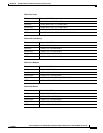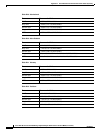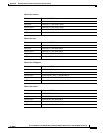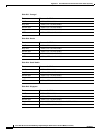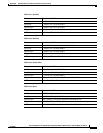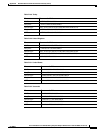
GL-1
Cisco ATA 186 and Cisco ATA 188 Analog Telephone Adaptor Administrator’s Guide for MGCP (version 3.0)
OL-4803-01
GLOSSARY
Numerics
10BaseT
10-Mbps baseband Ethernet specification using two pairs of twisted-pair cabling (Categories 3, 4, or
5): one pair for transmitting data and the other for receiving data. 10BaseT, which is part of the
IEEE 802.3 specification, has a distance limit of approximately 328 feet (100 meters) per segment.
A
A-law
ITU-T companding standard used in the conversion between analog and digital signals in PCM
systems. A-law is used primarily in European telephone networks and is similar to the North American
µ-law standard. See also companding and µ-law.
AVT tones
Out-of-bound signaling as defined in RFC 2833.
C
category-3 cable
One of five grades of UTP cabling described in the EIA/TIA-586 standard. Category 3 cabling is used
in 10BaseT networks and can transmit data at speeds up to 10 Mbps.
CED tone detection
Called station identification. A three-second, 2100 Hz tone generated by a fax machine answering a
call, which is used in the hand-shaking used to set the call; the response from a called fax machine to
a CNG tone.
CELP
code excited linear prediction compression. Compression algorithm used in low bit-rate voice
encoding. Used in ITU-T Recommendations G.728, G.729, G.723.1.
CLIP
Calling Line Identification Presentation. Shows your identity to callers with Caller ID.
CLIR
Calling Line Identification Restriction. Hides your identity from callers with Caller ID.
CNG
Comfort Noise Generation.
codec
coder/decoder. In Voice over IP, Voice over Frame Relay, and Voice over ATM, a DSP software
algorithm used to compress/decompress speech or audio signals.
companding
Contraction derived from the opposite processes of compression and expansion. Part of the PCM
process whereby analog signal values are rounded logically to discrete scale-step values on a nonlinear
scale. The decimal step number then is coded in its binary equivalent prior to transmission. The process
is reversed at the receiving terminal using the same nonlinear scale. Compare with compression and
expansion. See also a-law and µ-law.



